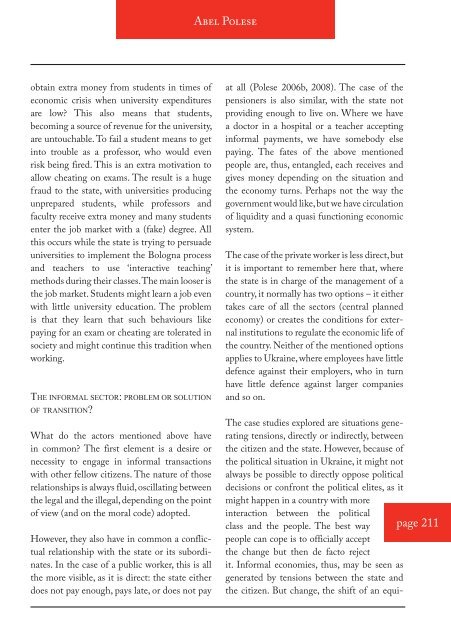Heft36 1 - SFB 580 - Friedrich-Schiller-Universität Jena
Heft36 1 - SFB 580 - Friedrich-Schiller-Universität Jena
Heft36 1 - SFB 580 - Friedrich-Schiller-Universität Jena
You also want an ePaper? Increase the reach of your titles
YUMPU automatically turns print PDFs into web optimized ePapers that Google loves.
ABEL POLESE<br />
obtain extra money from students in times of<br />
economic crisis when university expenditures<br />
are low? This also means that students,<br />
becoming a source of revenue for the university,<br />
are untouchable. To fail a student means to get<br />
into trouble as a professor, who would even<br />
risk being fired. This is an extra motivation to<br />
allow cheating on exams. The result is a huge<br />
fraud to the state, with universities producing<br />
unprepared students, while professors and<br />
faculty receive extra money and many students<br />
enter the job market with a (fake) degree. All<br />
this occurs while the state is trying to persuade<br />
universities to implement the Bologna process<br />
and teachers to use ‘interactive teaching’<br />
methods during their classes. The main looser is<br />
the job market. Students might learn a job even<br />
with little university education. The problem<br />
is that they learn that such behaviours like<br />
paying for an exam or cheating are tolerated in<br />
society and might continue this tradition when<br />
working.<br />
THE INFORMAL SECTOR: PROBLEM OR SOLUTION<br />
OF TRANSITION?<br />
What do the actors mentioned above have<br />
in common? The first element is a desire or<br />
necessity to engage in informal transactions<br />
with other fellow citizens. The nature of those<br />
relationships is always fluid, oscillating between<br />
the legal and the illegal, depending on the point<br />
of view (and on the moral code) adopted.<br />
However, they also have in common a conflictual<br />
relationship with the state or its subordinates.<br />
In the case of a public worker, this is all<br />
the more visible, as it is direct: the state either<br />
does not pay enough, pays late, or does not pay<br />
at all (Polese 2006b, 2008). The case of the<br />
pensioners is also similar, with the state not<br />
providing enough to live on. Where we have<br />
a doctor in a hospital or a teacher accepting<br />
informal payments, we have somebody else<br />
paying. The fates of the above mentioned<br />
people are, thus, entangled, each receives and<br />
gives money depending on the situation and<br />
the economy turns. Perhaps not the way the<br />
government would like, but we have circulation<br />
of liquidity and a quasi functioning economic<br />
system.<br />
The case of the private worker is less direct, but<br />
it is important to remember here that, where<br />
the state is in charge of the management of a<br />
country, it normally has two options – it either<br />
takes care of all the sectors (central planned<br />
economy) or creates the conditions for external<br />
institutions to regulate the economic life of<br />
the country. Neither of the mentioned options<br />
applies to Ukraine, where employees have little<br />
defence against their employers, who in turn<br />
have little defence against larger companies<br />
and so on.<br />
The case studies explored are situations generating<br />
tensions, directly or indirectly, between<br />
the citizen and the state. However, because of<br />
the political situation in Ukraine, it might not<br />
always be possible to directly oppose political<br />
decisions or confront the political elites, as it<br />
might happen in a country with more<br />
interaction between the political<br />
class and the people. The best way page 211<br />
people can cope is to officially accept<br />
the change but then de facto reject<br />
it. Informal economies, thus, may be seen as<br />
generated by tensions between the state and<br />
the citizen. But change, the shift of an equi-
















